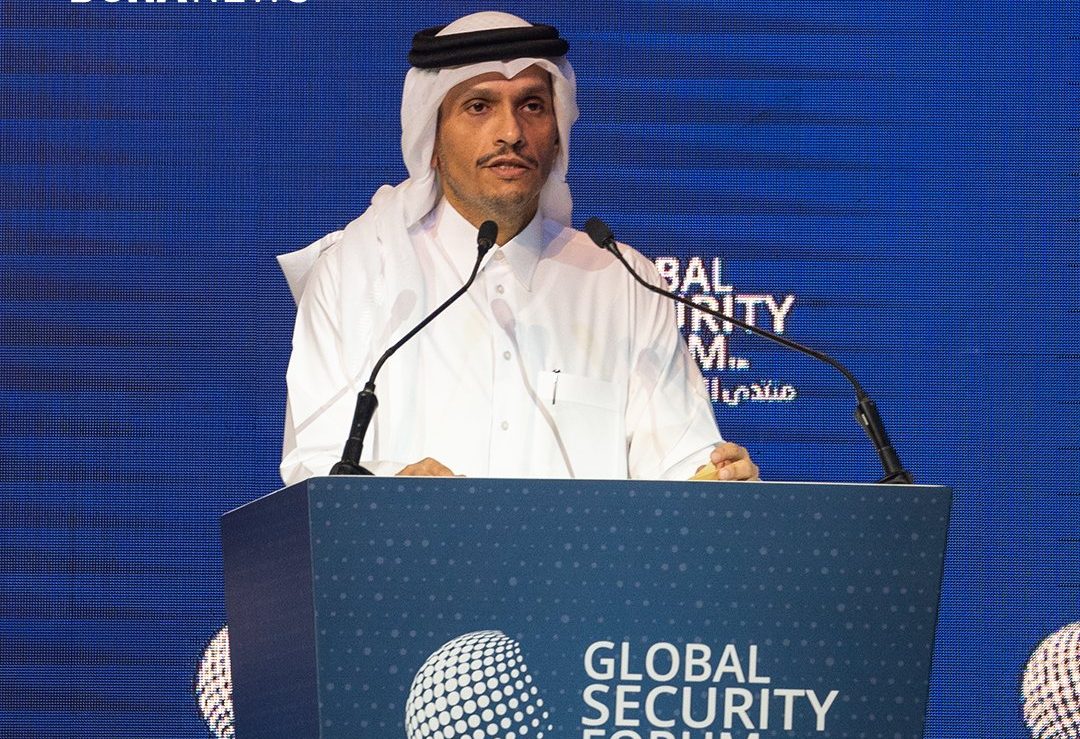Qatar’s Prime Minister Sheikh Mohammed bin Abdulrahman Al-Thani addresses the Global Security Forum, offering condolences to Iran and highlighting the Gaza crisis, urging international action for peace and stability.
Qatar’s Prime Minister Sheikh Mohammed bin Abdulrahman Al-Thani addressed the Global Security Forum (GSF) in Doha on Monday, where he highlighted the latest global political and humanitarian challenges.
Sheikh Mohammed’s remarks came just hours after Iranian authorities confirmed the death of Iran’s President Ebrahim Raisi, Foreign Minister Hossein Amir-Abdollahian along with their delegation.
The late Iranian leader and his delegation died in a helicopter crash on Sunday, which prompted search efforts.
“I would like to offer my condolences to the brotherly Iranian people following the death of the President of the Iranian Republic, the foreign minister and their accompanying delegation in yesterday’s accident,” Sheikh Mohammed said during his speech.
This year’s edition is held under the theme ‘Strategic Competition: The Complexity of Interdependence’ and is taking place between May 20-22 at the Sheraton Hotel in Doha.
Sheikh Mohammed, who is also Qatar’s foreign minister, highlighted the worsening crisis in Gaza in light of the ongoing Israeli war on the Strip. Since October 7, 2023, Israel has killed at least 35,456 people, including more than 15,000 children, in Gaza.
“The scale of the humanitarian tragedy there [in Gaza] is worsening every day, which requires intensifying international efforts, whether those concerned with ending the conflict or humanitarian efforts to ensure the arrival of aid,” he said.
The delivery of aid in Gaza has been disrupted since Israeli occupation forces invaded the Rafah Crossing on May 6. The shared Gaza-Egypt border is a vital portal for the entry of aid and the movement of people in and out of the Strip.
The invasion of the crossing also came under Israel’s plans to launch a full-scale invasion of the city of Rafah in southern Gaza, where more than one million people have been seeking shelter since the start of the war.
The attacks on Rafah created another mass displacement crisis, with hundreds of thousands forced to flee the area again.
Qatar’s prime minister underlined the threats the policies of occupation and forced displacement pose to regional and international peace.
“History has proven that the cost of any occupation and its consequences are greater than any expected outcome for the occupier. The policies of occupation, forced displacement, and collective punishment never resulted in an end to any conflict, but were instead fuel for the continuation and expansion of violence,” he said.
Qatar has been playing a crucial mediating role between Israel and Hamas since the beginning of the war in Gaza in hopes of reaching a ceasefire and captives’ release deal. Last year, Qatar and Egypt’s mediation led to a week-long truce in Gaza that resulted in the release of 109 captives.
However, the talks have since stalled, particularly since the beginning of the Rafah invasion.
Commenting on Qatar’s global mediation roles, Sheikh Mohammed stressed the importance of having a moral approach to resolving conflicts and crises globally.
“Our commitment in Qatar to work to prevent the collapse of peace, security and stability in the region and to employ diplomacy to resolve conflicts by peaceful means is not just a political commitment, but rather a moral commitment that stems from our collective responsibility towards the advancement of the most vulnerable peoples,” he said.







